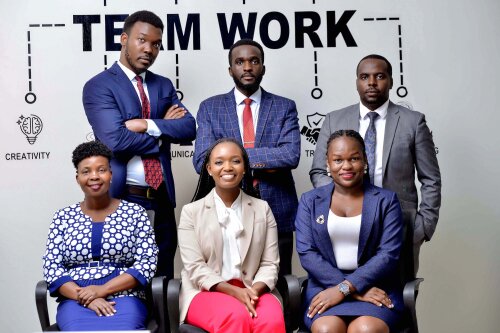Best Collaborative Law Lawyers in Kampala
Share your needs with us, get contacted by law firms.
Free. Takes 2 min.
Free Guide to Hiring a Family Lawyer
List of the best lawyers in Kampala, Uganda
About Collaborative Law in Kampala, Uganda
Collaborative Law is an innovative approach to resolving legal disputes outside of traditional courtroom settings. In Kampala, Uganda, this approach involves both parties working together with their lawyers to reach a mutually beneficial agreement. Traditionally applied to family law cases, including divorce and child custody, Collaborative Law emphasizes cooperation, transparency, and respect, helping parties to reach a resolution that suits everyone involved without contentious litigation.
Why You May Need a Lawyer
If you find yourself in a legal dispute where maintaining relationships and finding amicable solutions are important, you may require legal help in the field of Collaborative Law. Common situations include:
- Divorce or separation proceedings where you wish to avoid adversarial court battles.
- Disputes over child custody or visitation rights where cooperative solutions are preferable for the children involved.
- Negotiation of prenuptial or postnuptial agreements that require mutual understanding and fairness.
- Settling business partnerships disruptively where maintaining a working relationship is beneficial.
Local Laws Overview
In Kampala, Uganda, certain key aspects of local laws are relevant to the practice of Collaborative Law:
- Family Law: Emphasizes the best interest of children in custody cases and the equitable distribution of property during divorce.
- Civil Procedure: Allows for alternative dispute resolution mechanisms, including mediation and arbitration, which align with the principles of Collaborative Law.
- Contract Law: Governs agreements reached through the Collaborative Law process, ensuring they are legally binding and enforceable.
Understanding these laws helps ensure that any agreements reached are within legal frameworks and are recognized by the courts if necessary.
Frequently Asked Questions
What is Collaborative Law?
Collaborative Law is a legal process that focuses on resolving disputes amicably without going to court, typically involving negotiation and mediation.
How does Collaborative Law differ from traditional litigation?
Unlike traditional litigation, which is often adversarial, Collaborative Law focuses on cooperation and finding solutions that benefit all parties involved.
What types of cases can Collaborative Law be applied to?
Collaborative Law is commonly used in family law cases such as divorce, child custody, and property settlement, but can also apply to business disputes.
How can I find a collaborative lawyer in Kampala?
Look for legal professionals or law firms in Kampala who specialize in alternative dispute resolution or specifically advertise Collaborative Law services.
What are the benefits of using Collaborative Law in family disputes?
Collaborative Law can make the process less adversarial, reducing emotional stress and helping maintain family relationships during and after the dispute.
Do both parties need to agree to pursue Collaborative Law?
Yes, Collaborative Law is a consensual process, and both parties must agree to resolve their dispute collaboratively.
Will our agreements be legally binding?
Yes, agreements reached through Collaborative Law can be made legally binding through contracts or court orders, depending on the situation.
What happens if the collaborative process breaks down?
If the process is unsuccessful, parties may proceed to court litigation, but they often must find new legal representation due to confidentiality agreements.
Is collaborative law recognized by Ugandan courts?
While Collaborative Law is not a separate legal framework, agreements reached through this process can be recognized and enforced by Ugandan courts.
Can collaborative law save me money compared to court litigation?
Yes, it often results in fewer legal expenses as it seeks to resolve disputes more efficiently and amicably than traditional litigation.
Additional Resources
For more information or assistance, consider consulting the following resources:
- Uganda Law Society: Offers resources and guidance on legal practices in Uganda.
- The Centre for Alternative Dispute Resolution: Provides information on non-litigious dispute resolution methods, including Collaborative Law.
- Local family law firms: Many provide free consultations and can direct you towards collaborative solutions.
Next Steps
If you require legal assistance in Collaborative Law, take the following steps:
- Identify and contact lawyers or law firms in Kampala specializing in Collaborative Law.
- Schedule a consultation to discuss your situation and explore collaborative options.
- Ensure that both parties agree to participate in the collaborative process.
- Engage professionals in the process, such as financial planners or child specialists, if additional expertise is required.
- Work with your lawyer to prepare emotionally and logistically for negotiations or mediations.
- Keep focused on achieving a mutually beneficial resolution without resorting to adversarial litigation.
Lawzana helps you find the best lawyers and law firms in Kampala through a curated and pre-screened list of qualified legal professionals. Our platform offers rankings and detailed profiles of attorneys and law firms, allowing you to compare based on practice areas, including Collaborative Law, experience, and client feedback.
Each profile includes a description of the firm's areas of practice, client reviews, team members and partners, year of establishment, spoken languages, office locations, contact information, social media presence, and any published articles or resources. Most firms on our platform speak English and are experienced in both local and international legal matters.
Get a quote from top-rated law firms in Kampala, Uganda — quickly, securely, and without unnecessary hassle.
Disclaimer:
The information provided on this page is for general informational purposes only and does not constitute legal advice. While we strive to ensure the accuracy and relevance of the content, legal information may change over time, and interpretations of the law can vary. You should always consult with a qualified legal professional for advice specific to your situation.
We disclaim all liability for actions taken or not taken based on the content of this page. If you believe any information is incorrect or outdated, please contact us, and we will review and update it where appropriate.
















